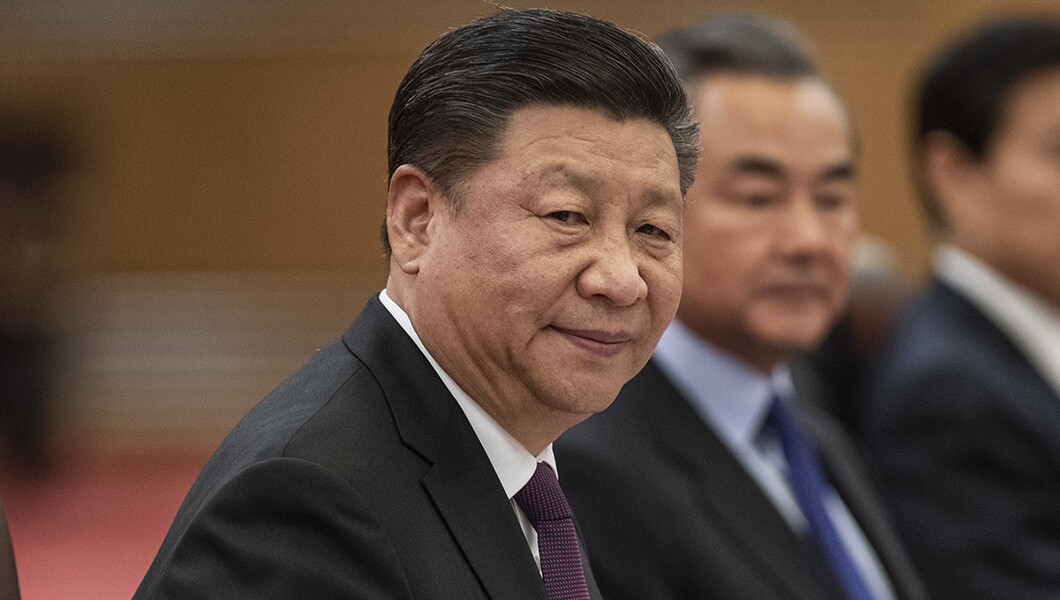
Chinese General Secretary Xi Jinping fumed at U.S. efforts to restrict Beijing’s access to advanced Western technology as a week of tensions over a downed Chinese balloon punctuated a wider diplomatic struggle for influence and cooperation.
“The act of power hegemony to engage in ideological confrontation, politicize and weaponize economic, trade, scientific and technological exchanges, push for ‘decoupling and breaking the chain,’ contain and suppress other countries’ development, and ask regional nations to take sides, will not be supported by the people,” Xi said Friday, according to state media.
That broadside coincided with a more specific denunciation of a U.S. initiative to prevent China from purchasing the machinery needed to manufacture high-end microchips, or semiconductors. President Joe Biden’s team is trying to orchestrate an agreement on export controls with the Netherlands and Japan, a pair of allied countries home to major providers of that equipment — an initiative that could lead to China’s technology sector “being strangled by foreign countries,” as Xi has said recently.
“To maintain its economic and technological supremacy, the U.S has overstretched the concept of national security, abused export control measures, disrupted normal economic and trade activities, and destabilized global industrial and supply chains,” Chinese Foreign Ministry spokeswoman Mao Ning said Friday. “This is a complete departure from the principles of market economy and fair competition that the US has long claimed to champion.”
THE SPY BALLOON THAT CHANGED THE US CONVERSATION ABOUT CHINA
Xi has presided over a souring of diplomatic relations with the United States, driven in part by his claim to sovereignty over the South China Sea — an expansive assertion that covers international waters and areas claimed by other states, including U.S. allies — and widespread anxiety about Chinese military threats against Taiwan.
Mao’s rhetorical fusillade coincided with a new violation of U.S. airspace, one culminated in a sortie of F-22 fighter jets to shoot down an “object” over Alaska.
“At this point, we don’t know the origin of the object,” Air Force Brig. Gen. Pat Ryder, the Pentagon press secretary, told reporters on Friday. “Given the fact that it was operating at an altitude that posed a reasonable threat to civilian air traffic, the determination was made, and the president gave the order to take it down.”

The detection of the balloon last week by a photojournalist in Montana resulted in the cancellation of Secretary of State Antony Blinken’s expected trip to China.
“There are going to be times, when there’s activities happening that we’re monitoring, that we’re not going to go public, especially if it doesn’t present a particular or pose a significant threat to the American public,” Ryder said. “But again, as we monitored that balloon, there was an effort underway to ensure that folks understood what this was especially given how visible it was.”
Blinken was poised to meet with Xi for the stated purpose of ensuring that “competition doesn’t veer into conflict,” as his spokesman put it. Instead, the balloon’s detection prompted a public outcry and spurred leaders of both governments into a new round of political and diplomatic signaling, as Biden emphasized that “winning the competition with China should unite all of us” during his State of the Union address, while Xi countered that China’s emergence as an economic heavyweight offers “a new modernization model, different from the West” that amounts to a “brand new form of human civilization” for other countries to embrace.
“We have completed in decades the industrialization process that had taken developed Western countries hundreds of years,” Xi said Tuesday in an address to regime officials, per a South China Morning Post translation.
That boast points to the communist regime’s ambitions in the competition with the United States, which many American analysts expect to turn on a race for technological superiority in a range of domains.
CLICK HERE TO READ MORE FROM THE WASHINGTON EXAMINER
“The CCP’s primary objective is not to beat us in war; it’s to beat us in everything else,” the Brookings Institution foreign policy fellow Melanie Sisson said during a House Armed Services Committee hearing on Monday while discussing Chinese telecommunications companies. “And this is part of that, and we need to be attentive to that strategic view.”






